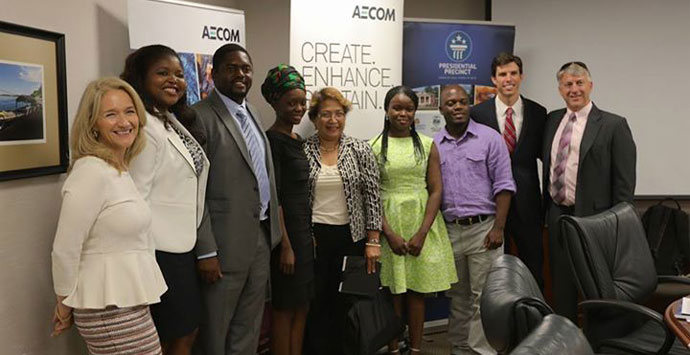YALI Reflections: Benefiting from the guidance of AECOM experts
Initially, six weeks looked like a very long time but it flew by so fast.
When I heard that I had been selected for the Mandela Washington Young African Leaders Initiative and would be at the Presidential Precinct, I was excited. It couldn’t have come at a better time as I was just about to kick-start a project dear to my heart and needed time to concentrate on it and also have experts guide me.
It had been a busy year for me. Working six days a week as the editor of Sunday Punch, Nigeria’s most widely circulated newspaper, six weeks in the United States of America sounded heavenly.
As I sat on my connecting flight to Virginia, I went through the faces of my classmates and the faculty that the Presidential Precinct had earlier sent to fellows. “I hope they are cool people,” I mused.
It turns out they were cool and so much more. Any time I’m asked to talk about my experiences, I feel they cannot be summarised in a few words. It’s almost impossible to compress the experiences of six institutions, lectures from over 100 teachers and adventures with 21 other fellows in a few lines. I could write a book about it.
During the fellowship, one of my “aha” moments was when I met Anne Ellis, vice president of global initiatives, at AECOM. The first time I saw Anne was at Montpelier when AECOM Senior Vice President and Director of Global Program Management Timothy McManus was discussing development economics and infrastructure financing. Anne listened intensely and when any fellow asked her questions, she knew the person’s background and history. She had spent time reading our biographies.
As the first female and youngest editor of Punch Newspaper, which is over 40 years old, I’m always eager to learn from women who have broken barriers in their industries. Always offering encouraging words to the fellows, Anne epitomised the ideals of exemplary leadership that we were taught. While talking about why AECOM was the major sponsor of the fellowship at the Presidential Precinct, she said the Fortune 500 company believed in Africa’s future leaders.
In class, Timothy left no doubt in our minds that AECOM knows its business as he kept reeling out economic figures and projections about Nigeria and the countries of other fellows.
While Tim kept harping on the need for efficient infrastructural planning and the merits of public-private partnerships, he opened my eyes to the enormous possibilities in my country due to its size and population and the need to effectively plan for the future by putting the right infrastructure in place.
Joe Wambia, AECOM managing director for finance, global programs and Africa, was, however, the first AECOM executive we met. He was with the fellows at the Presidential Precinct right from the beginning. Joe spoke about economics and trade from Asia to Africa.
As I write this, I can hear Joe’s voice in class saying: “This will be an interactive class. Everyone should be involved. You are going to be teaching me.” I remember when he got us talking about “bottom-up and bottom-down” development styles and divided the class into two groups: pro-bottom down and pro-bottom up. At the end, we realised that there was no one answer to economic development.
At the centre of the sessions with AECOM’s executives was the topic of sustainability. According to Gary Lawrence, AECOM vice president and chief sustainability officer, any project or endeavour that does not factor in all aspects of sustainability may not succeed. Giving practical examples, Gary said the cultural, economic, political, technological and environmental dimensions must not be ignored.
Practising what it preaches, AECOM kept in touch with the fellows when we left Virginia and invited some of us to its Washington, D.C., office, where we met some members of the AECOM family and shared our experiences with them.
I got home to receive messages from AECOM executives telling me that they were a phone call or an email away should I need their help in any way.
There was no better way to demonstrate the company’s commitment to Africa, its future, its people and its leaders.
 Oluwatoyosi Ogunseye is the first female editor in the 40-plus-year history of Punch Newspaper, Nigeria’s most widely read newspaper. The recipient of 30 local and international awards, she is presently working on a leadership curriculum for primary and secondary schools in Nigeria.
Oluwatoyosi Ogunseye is the first female editor in the 40-plus-year history of Punch Newspaper, Nigeria’s most widely read newspaper. The recipient of 30 local and international awards, she is presently working on a leadership curriculum for primary and secondary schools in Nigeria.
LinkedIn: Toyosi Ogunseye







